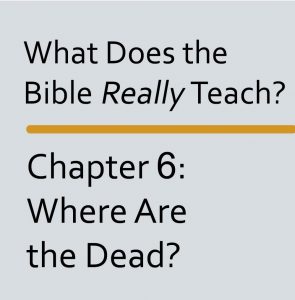The “Soul” and “Spirit” Appendix
This portion of “Bible Teach” shows the importance of defining terms biblically.
Chapter 6, paragraph 5 (p. 58) refers you to an appendix entitled, “’Soul’ and ‘Spirit’—What Do These Terms Really Mean?”
That appendix states, “Many believe that these words mean something invisible and immortal that exists inside us. They think that at death this invisible part of a human leaves the body and lives on. Since this belief is so widespread, many are surprised to learn that it is not at all what the Bible teaches.” (p. 208, the appendices don’t have numbered paragraphs)
No mention is made whatever of Jesus’ account of the rich man and Lazarus in Luke 16:19-31. This is an ideal opportunity to discuss that passage, using the points I made in The Justice for the Wicked Approach from my book, Getting Through to Jehovah’s Witnesses: Approaching Bible Discussions in Unexpected Ways, (pp. 256-263).
Although “Bible Teach” doesn’t mention the Watchtower’s fanciful allegorical interpretation of that passage, you can assume that the Witnesses will do so if you insist on discussing the passage.
In addition to the extensive comments I made in my book, I have done two blog posts— “Discussing the Rich Man and Lazarus: Explaining the Christian Understanding” and “Discussing the Rich Man and Lazarus: Why an ‘After Death’ Story?”
Page 209 of the appendix quotes Genesis 35:16-19 as saying of Rachel’s death, “her life was slipping away [“her soul was going out,” footnote].”
I’m not sure why the Watchtower did this, because it supports the Christian position and undermines theirs. Point out that it literally says, “her soul was going out,” and ask, “Out of what, if not her body?”
Page 210 claims that Ezekiel 18:4, 20 teach that the human soul is mortal; it dies. Both of those verses state, “The soul who sins is the one who will die.”
I have answered this on p. 255 of The Justice for the Wicked Approach from my book, Getting Through to Jehovah’s Witnesses: Approaching Bible Discussions in Unexpected Ways.
The answer—as is often the case—is context. Point out that the topic in Ezekiel 18 is not the condition of the dead. It is whether God judges a person for his own sins or for the sins of others. Here, the word “soul” is simply being used as a synonym for “person,” which is one of that word’s meanings. I’ve also discussed this issue in a blog post entitled, “Anatomy of a Proof Text: Ezekiel 18″.
Pages 210-211 claim that the spirit is an impersonal, animating force, analogous to electricity. In “Witnessing Principles I Learned” (p. 46 of my book), I recommend the following technique. Substitute that definition for the word “spirit” in 1 Corinthians 2:11 and see if it makes sense: “For who among men knows the thoughts of a man except the man’s impersonal, active life-force within him? In the same way no one knows the thoughts of God except the impersonal, active force of God.” Your point will be clear; an impersonal force can’t know anyone’s thoughts but our spirits and God’s Spirit can.
I’ve also covered this approach in a blog post entitled, “Witnessing to Jehovah’s Witnesses in Love: Communicate Effectively.”
Page 211 quotes Ecclesiastes 12:7: “The dust [of his body] returns to the earth, just as it was, and the spirit returns to the true God who gave it.” However, it goes on to explain the verse away: “This does not mean that the life-force actually travels to heaven. Rather, it means that for someone who dies, any hope of future life rests with Jehovah God. His life is in God’s hands, so to speak. Only by God’s power can the spirit, or life-force, be given back so that a person may live again.”
Similarly, paragraph 6 of Chapter 6 (pp. 59) explains that when a person dies, there’s no soul or spirit that goes anywhere. Rather, his life is like the flame of a candle that goes away when it is extinguished.
I recommend that you respond with a point similar to the one I made on p. 110 of The Bodily Resurrection Approach in my book by saying something like this: “In order to have a resurrection, doesn’t something have to die and then come back to life again? When it comes to Jesus, whom the book says was resurrected as a spirit, then what part of him died and came back to life again? It wasn’t his physical body, right? And this book teaches that he didn’t have a separate soul and that his spirit was just an impersonal force. So what exactly died and then came back to life again?”
I have also discussed this point in a blog post entitled, “According to the Watchtower, What Died and Was Raised?”
In my opinion, the Watchtower has no good answer to that question.
Next time, we will talk about how to deal with Watchtower afterlife proof texts.


Leave a Reply
Be the First to Comment!